Overview
Licenses for the following applications are managed from within Eleveo User Management:
-
Quality Management
-
Workforce Management
-
their additional modules (Conversations Explorer, WFO Analytics, eLearning, SpeechRec, Generative AI).
Call and Screen Recording licensing is handled separately. User Management itself doesn't require any additional licenses.
Uploading a license is the first task that should be completed after Deploying User Management. The above applications won't work without a valid license installed. License files can be obtained from Eleveo SaS using the Partner Portal. This page covers details related to license management.
Only an eleveo.admin user (or any user with a manage-licenses role assigned) is able to manage licenses.
Accessing User Management
If you are accessing User Management for the first time, proceed as described on the page Login to User Management.
Consuming a License
Licenses are consumed as soon as roles are assigned to users. The following rules apply to the way how licenses are assigned, and how this count is applied against the total number of licensed users:
-
if a user is enabled and has at least one application role assigned, this user is considered a user of this application and consumes one license
-
if an application role is assigned to a group, each group member will consume one license (ensure that the correct number of licenses are available!)
-
one user can consume the same license only once (no matter if a role is assigned to a user, to a group, or both)
-
users imported from User Federations (for example UCCE) also consume licenses - a 'first-come-first-serve' logic applies
-
the Default Users (eleveo.admin and eleveotrain) do not consume any license
Example:
There are 1000 users imported into User Management. The WFM_AGENT role was assigned to the 'AGENTS' group, containing 30 users, and the WFM_SCHEDULER was assigned to two users. As a result, 32 WFM licenses were consumed.
Types of Licenses
The following types of licenses can be issued:
-
commercial inactive – the first license file obtained from Eleveo SaS, used to generate an activation key in User Management
-
commercial active – the final license file provided by Eleveo SaS based on the activation key
-
temporary – license issued for a short period of time, without an activation key, can be used to evaluate the product
Grace Period
It is very important to activate the license file immediately. There is a 30 day grace period from the date of issue. At 00:00 hours on the 30th day, an inactive license stops working.
Expiration Period
When a license expires, access to applications is blocked. A new license file needs to be imported into User Management by eleveo.admin. To be notified in advance about license expiration, set the Expiration notification in days value on the Realm Settings page. To find more information, visit the page Managing Realm Settings.
Displaying License Information
To display license information in User Management, click License Management within the navigation tree on the left. The License Management screen will display.
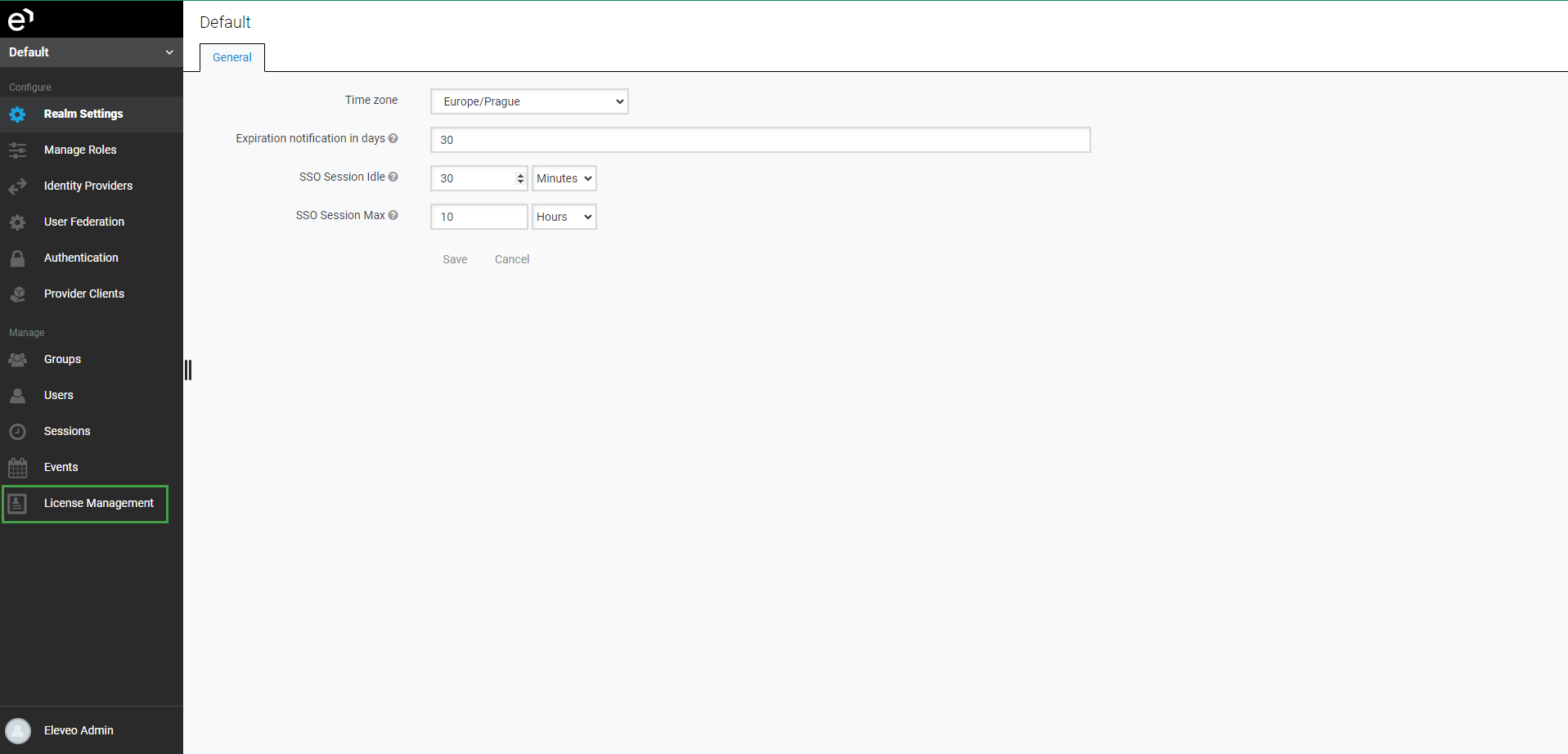
The table contains details of the uploaded license.

The following information is displayed in the table:
-
Tenant – name of the tenant for which the licenses were imported (it is always the tenant in which the eleveo.admin user exists, usually it is called 'default' in on-premise installations or it's the identifier (name) of the customer in cloud deployments)
-
Scope – list of the licensed applications/components
-
Usage – percentage and number of consumed licenses per each application/component
-
Details:
-
License Number – number of the license
-
Expiration Date – date when the licenses expire
-
State – OK when the license is active, NOT_ACTIVATED, or EXPIRED
-
-
Actions:
-
Copy activation key – button that allows copying of the activation key to request an active license (applies to inactive licenses only)
-
To be notified about the license expiration date in advance, go to Realm Settings and configure the Expiration notification in days value. An email will be sent to all users with the manage-license role, the defined number of days before the license expiration. Ensure that all these users have an email address configured in their settings.
Importing Licenses
The activation process consists of the following steps:
-
Importing a commercial inactive license
-
Activating a commercial inactive license
or
-
Importing a temporary license.
To import licenses, access User Management using the URL https://<FQDN>/auth-login (as described on the page Login to User Management). Then click License Management within the navigation tree on the left. The License Management screen will display.
Importing a Commercial Inactive License
Click the Import license button and select the license file obtained from Eleveo SaS (not yet activated).
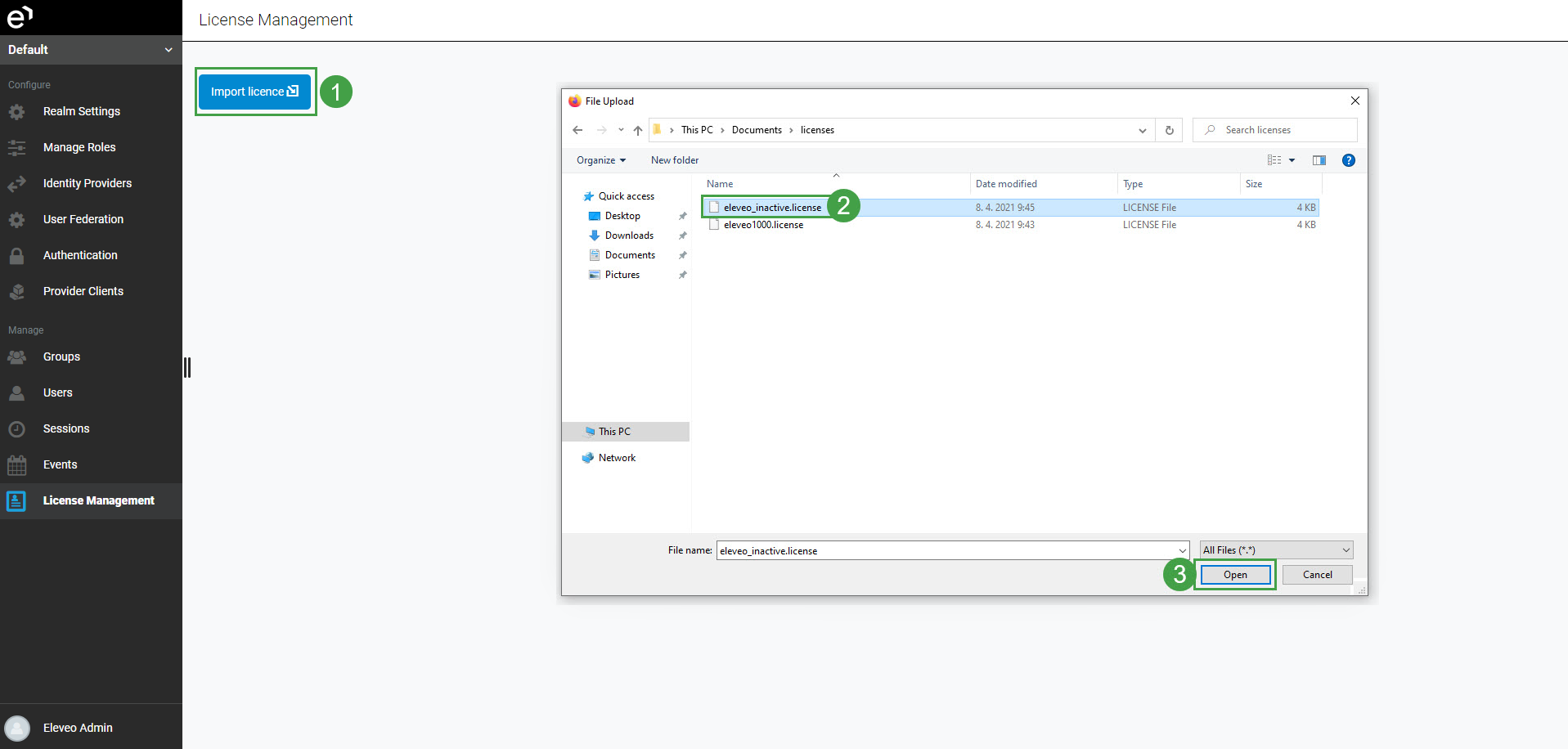
Then click Import.
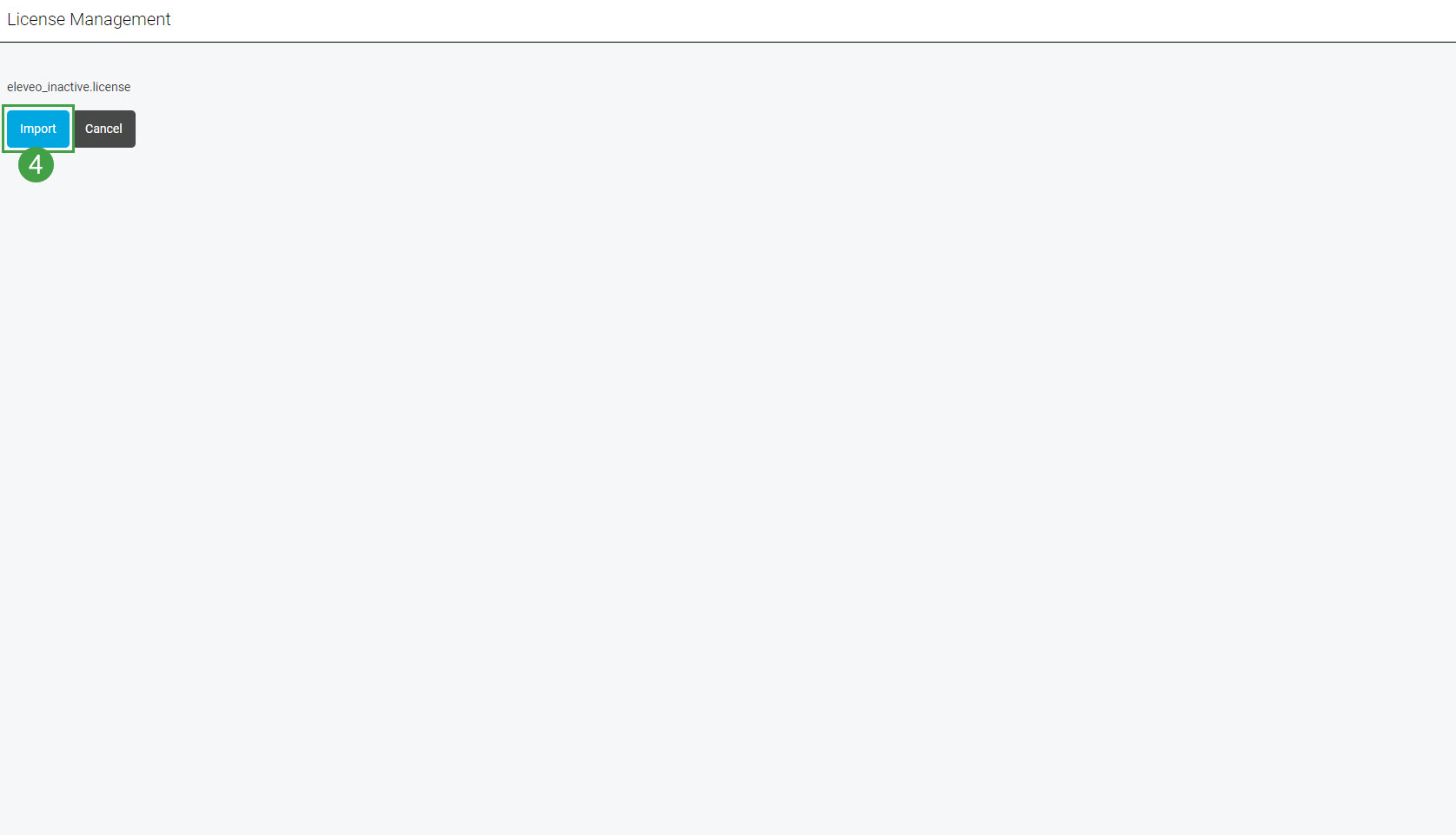
Once the inactive license has been successfully uploaded to the system, the activation key is generated based on a unique installation ID.
Click the Copy activation key button to copy the key. Then paste it into the Support contact form on the Partner Portal.
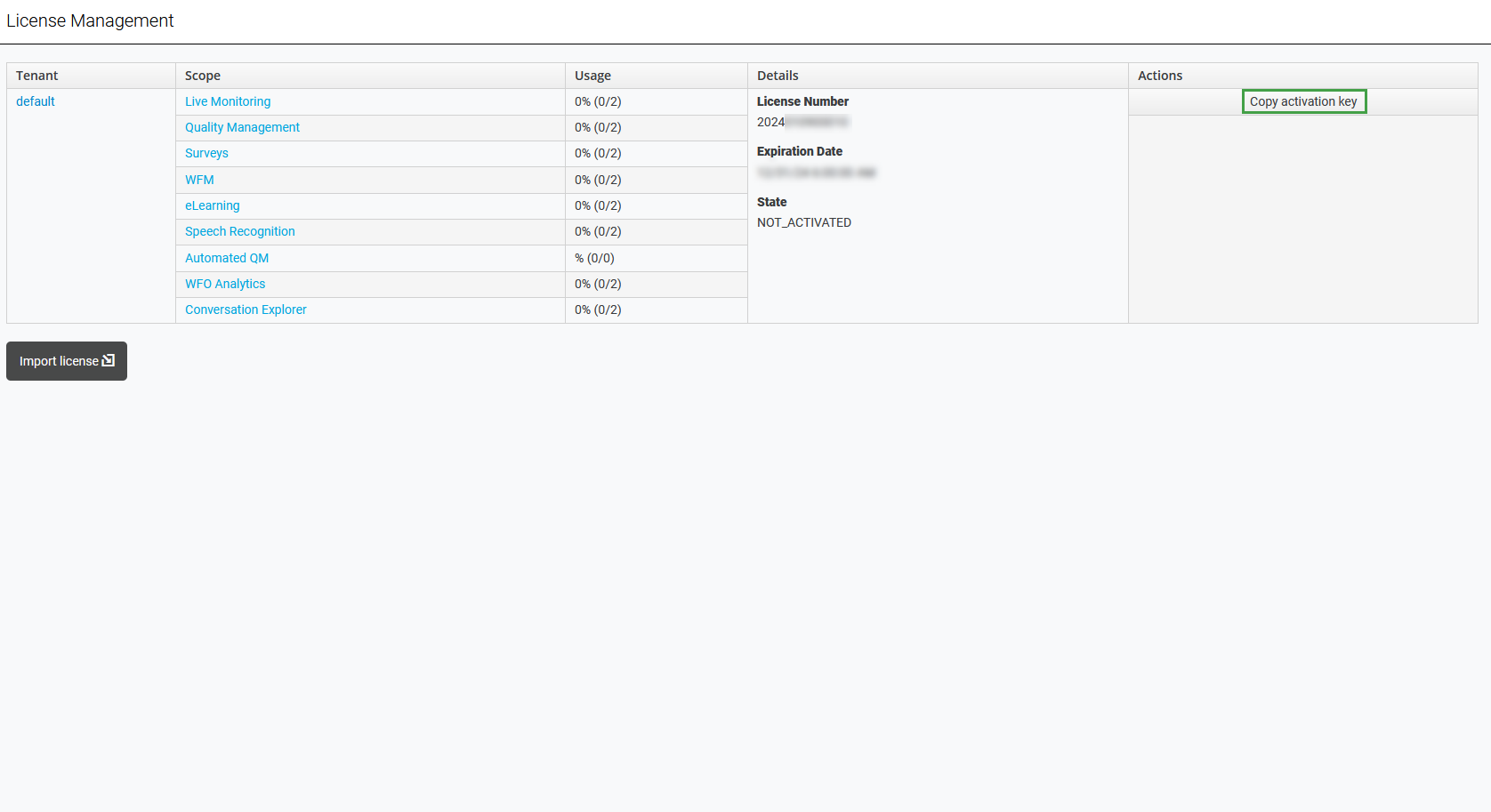
Support will send back an activated license file. Save this file where it can be accessed easily. Do not rename the file. Then proceed with the activation using the steps described below.
Activating a Commercial Inactive License
Go back to the License Management screen. Click the Import license button again and select the activated license file. Then click Import.
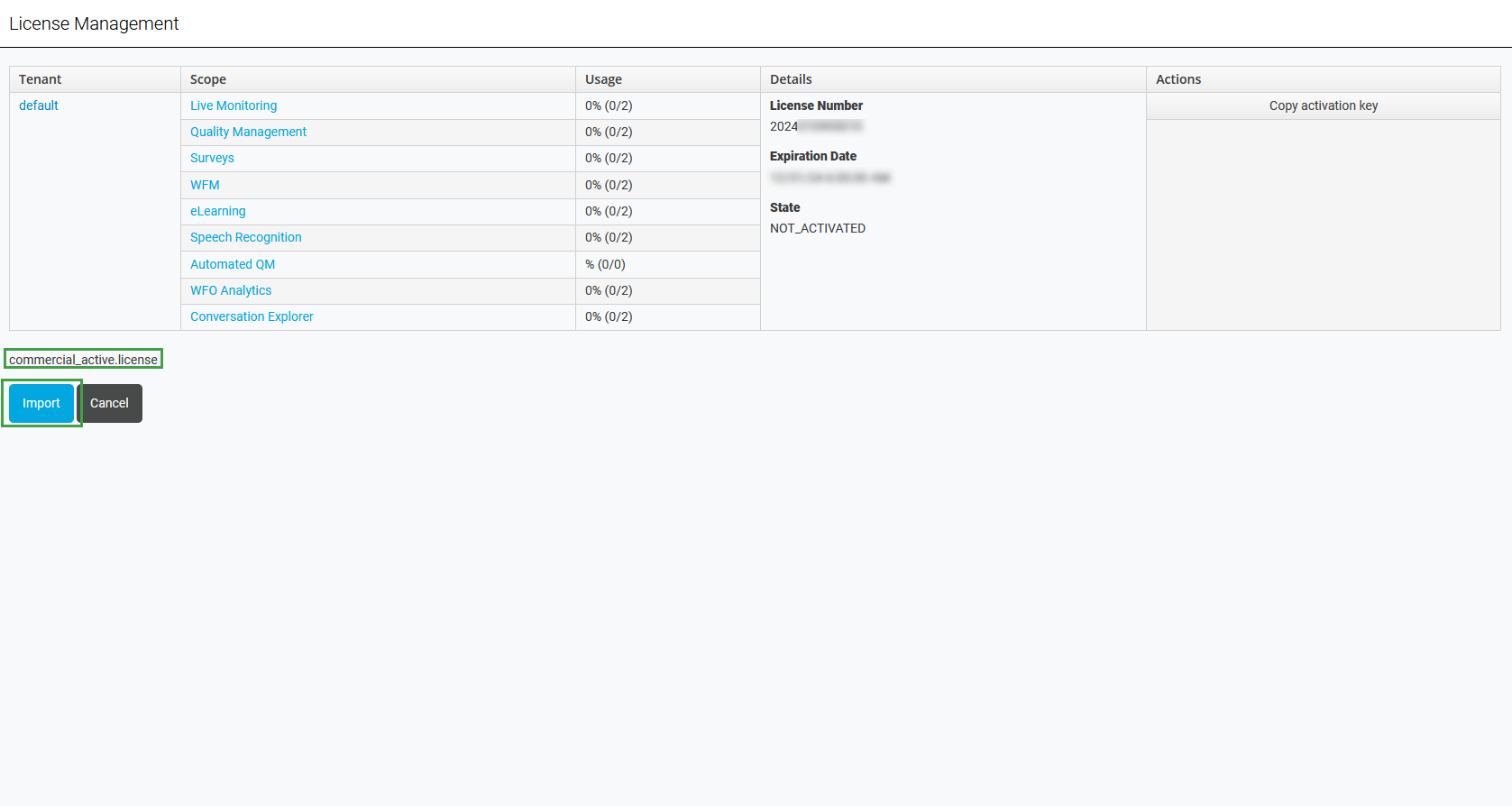
The license details will be updated with the expiration date and the OK state. Check if the uploaded license is correct.
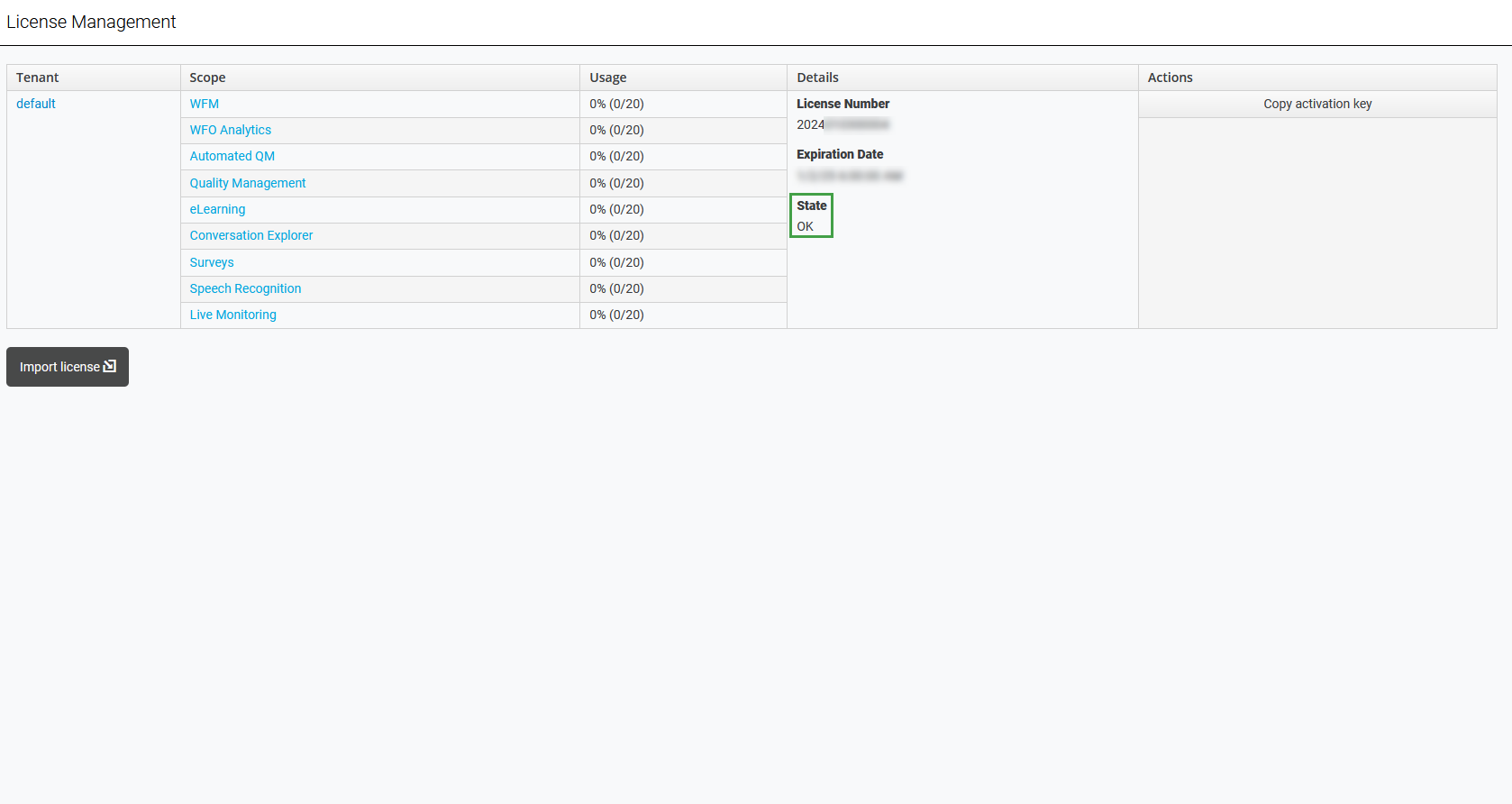
Importing a Temporary License
Click the Import license button and select the temporary license file obtained from Eleveo SaS.
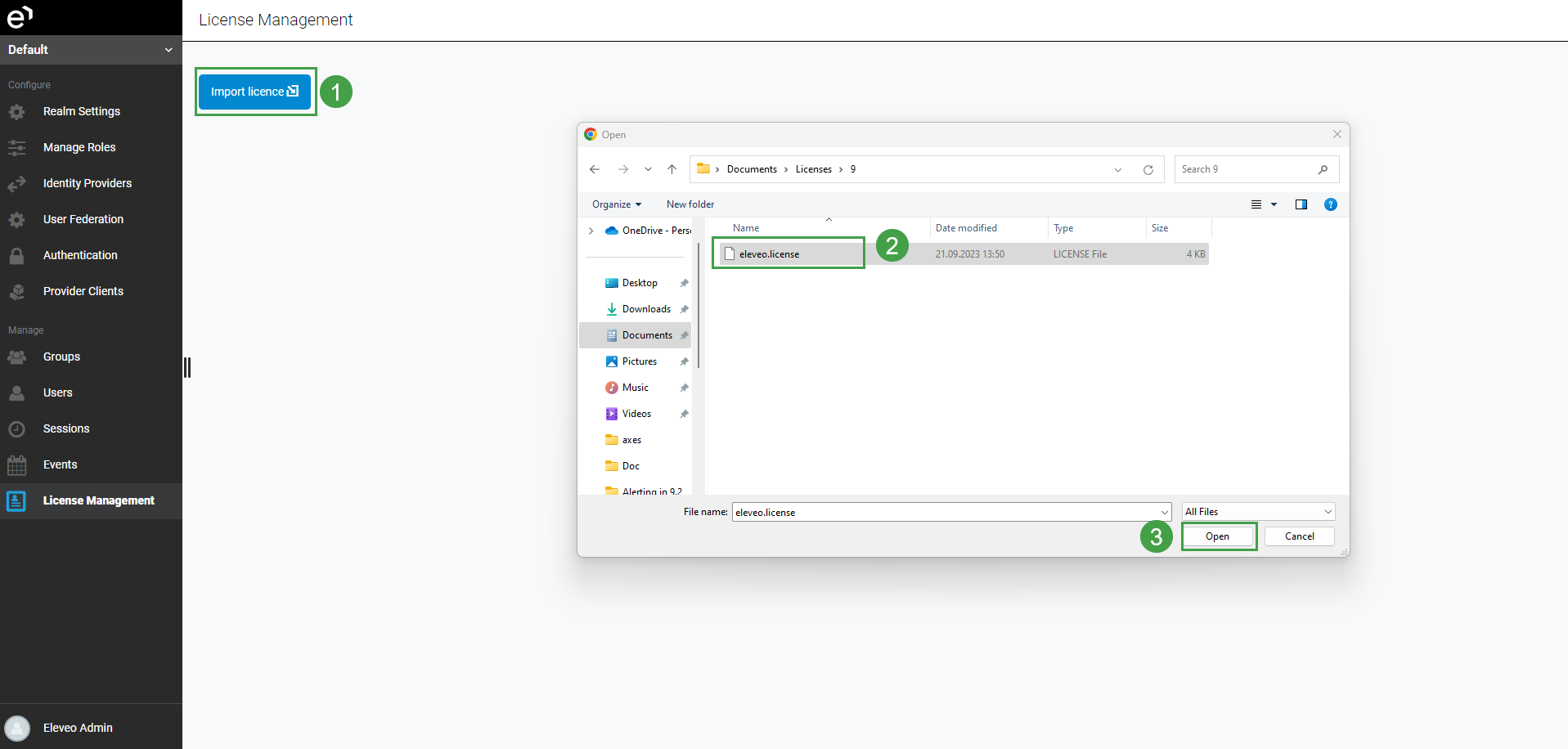
Then click Import.
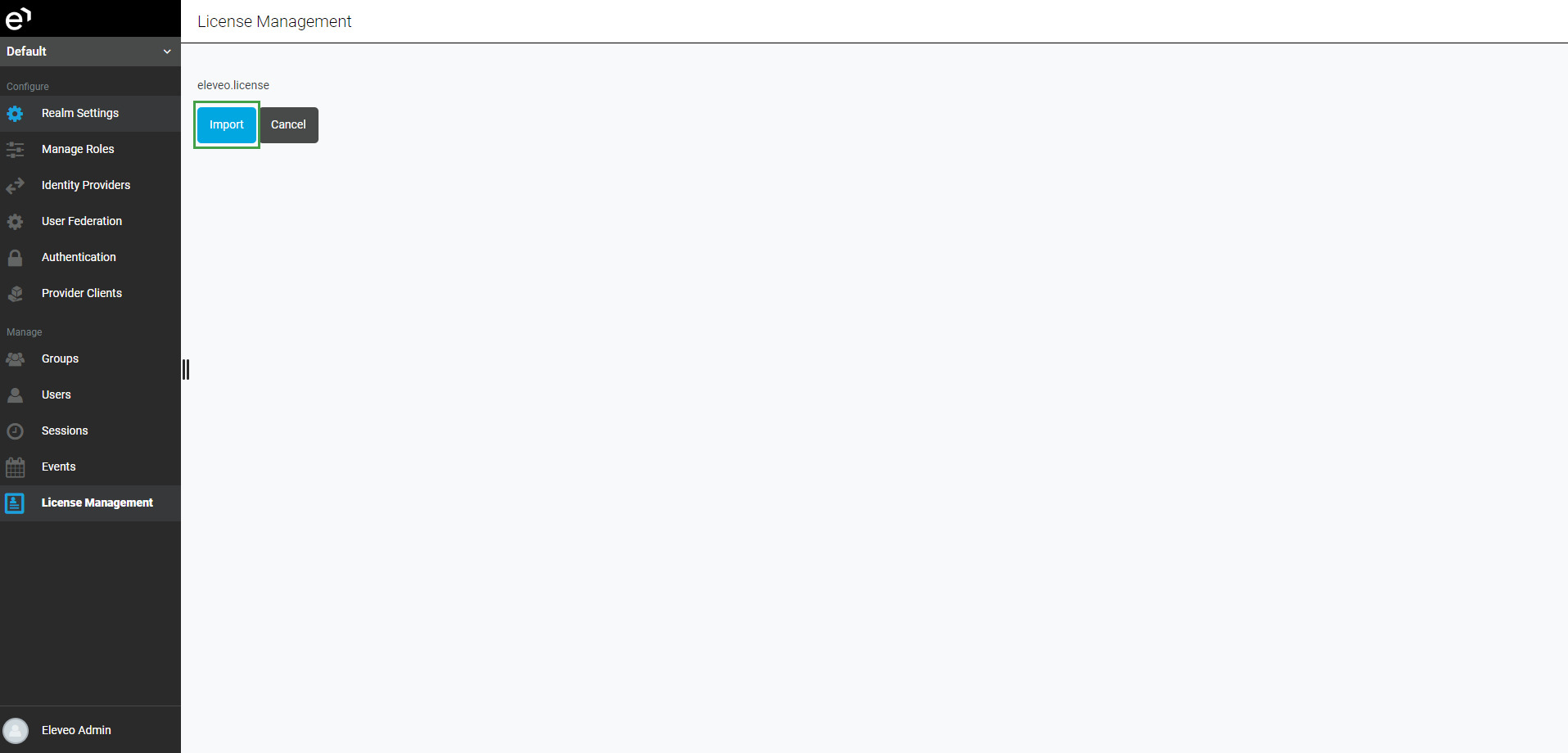
Once the temporary license has been successfully uploaded, it is immediately activated. There is no need to copy and send the Activation Key.
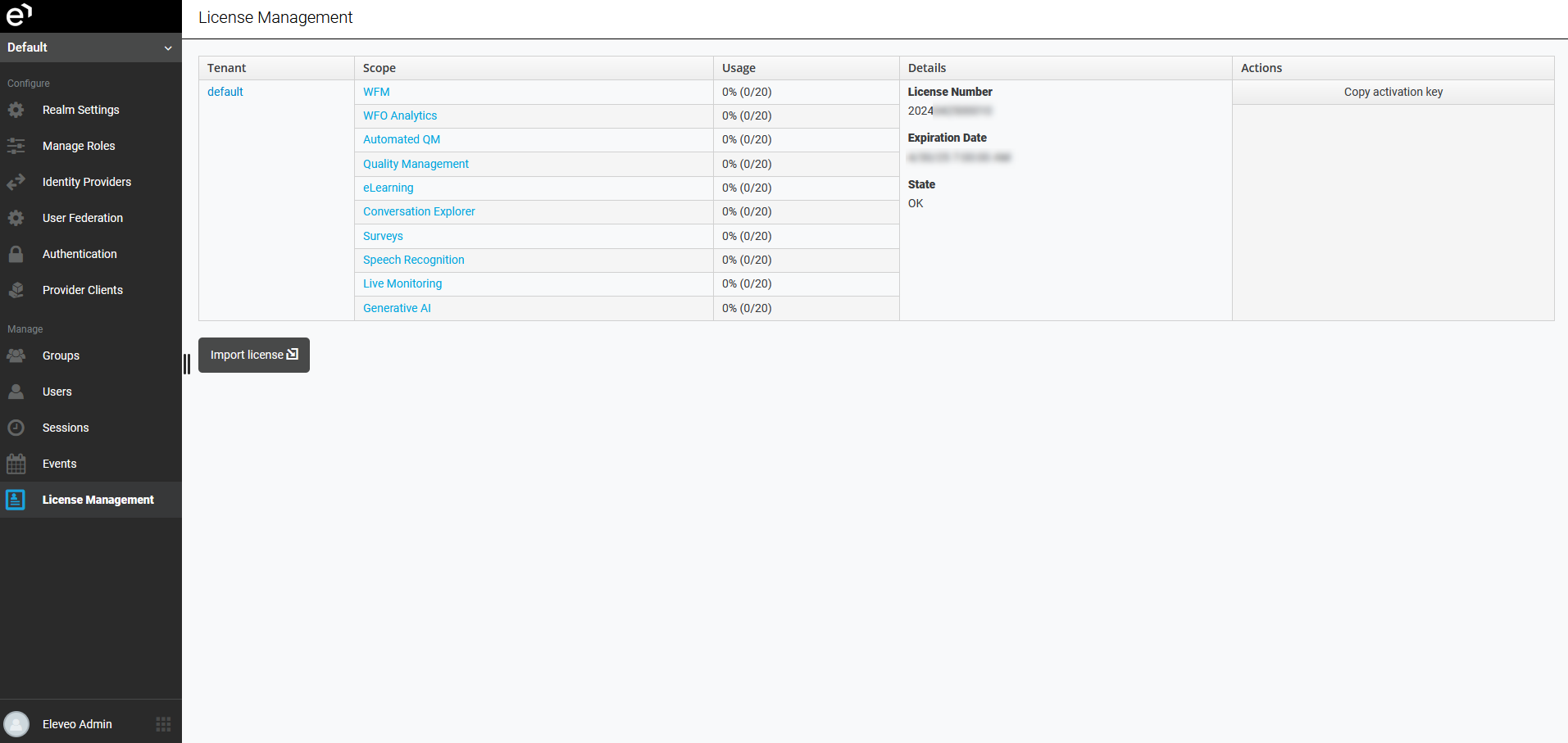
Check if the uploaded license is correct.
Displaying License Consumers
Licenses are consumed after assigning roles to users (more details can be found in the Consuming a License section above). To display users that consume a license, click on the name of the application/component. The License consumers table will display:


If there was an attempt to exceed the number of licenses, UM admin will get a message by email informing about which Eleveo realm is affected and which license-related application is trying to consume licenses above the limit.
Users may experience issues accessing particular services until license usage is adjusted.
In order to extend the licenses, please get in touch with your Eleveo sales representative or Eleveo Sales team at sales@eleveo.com. If there is a technical issue, contact Eleveo Support team at support@eleveo.com.
Enabling Licensing Alert
In the case that User Management tries to assign a licensed role to an imported user but there are not enough licenses available, User Management will import this user, but the user will be disabled (and the role won’t be assigned). It is possible to configure User Management to log these events. Additionally, all users who have the manage-licences or user-management-admin role assigned, as well as an email address configured in their user's properties, will receive an alert by email.
A prerequisite to receive the alert messages is to have a SMTP server configured. If you are not sure that it is properly configured, please contact Eleveo SaS.
To enable licensing alerts, follow the steps:
-
Click Events in the navigation tree on the left.
-
Go to the Config tab.
-
Add the licensing-event-listener in the Event Listeners field (click in the field and select the listener from a drop-down list).
-
Click the Save button.
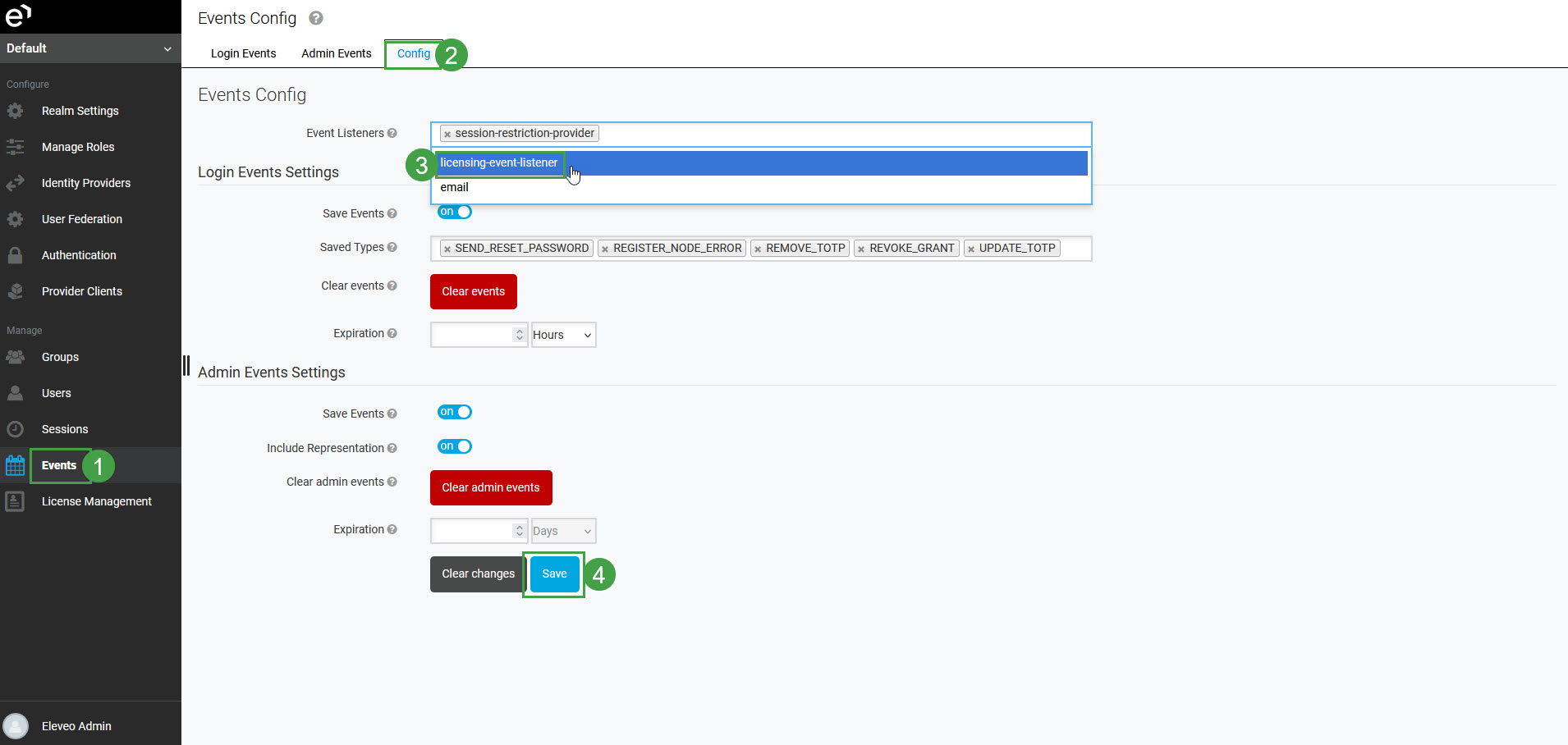
Potential Issues
|
Issue |
Reason |
|---|---|
|
A user cannot be enabled |
The license corresponding with this user's roles was not assigned to this user, because the number of users has exceeded the license's capacity. |
|
A user has no access to any application except User Management
|
The license has expired or no license was uploaded.
|
